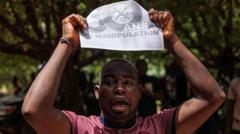In a significant move that has drawn the ire of opposition figures, Mali's ruling military junta has announced the dissolution of all political parties in the country, effectively quashing dissent just days after reports of abductions of opposition leaders. The stringent decree, broadcasted via state television, comes as a response to intensified calls for a return to democratic governance following the military's seizure of power in multiple coups over the past three years.
Mali's Military Junta Shuts Down All Political Parties Amid Democratic Backlash

Mali's Military Junta Shuts Down All Political Parties Amid Democratic Backlash
Mali's military leaders have officially dissolved all political parties as protests against their regime escalate.
In an official statement released Tuesday evening, the military government declared, "All meetings of members of political parties and organisations of a political character are dissolved across the national territory." This action, confirmed by Mali's military leader, Assimi Goïta, aims to solidify control amid growing discontent and widespread pro-democracy demonstrations that have taken place since the junta's rise to power in 2020 and 2021. Despite initial promises to restore civilian rule, the junta now plans to maintain its grip on power for another five years.
Concerns about repression of political activity have mounted, especially after last week's alleged abduction of two opposition leaders by armed individuals masquerading as police officers. The military regime has largely dismissed these incidents and their ramifications, further igniting tensions with dissenting factions.
In a national conference last month, heavily criticized by leading political parties, it was recommended that Gen Goïta be named president until 2030—prompting an outcry from human rights advocates and political opponents alike. The junta had initially committed to holding elections that were supposed to occur in February 2022, a promise that now feels hollow amidst this latest crackdown.
While the presidential decree did not specify penalties for continued political engagement, it suggested that individuals could continue serving in government roles independently of political affiliations. The primary opposition coalition has remained silent on the dissolution; however, member Nouhoum Togo of the Union for the Safeguarding of the Republic party downplayed the move, asserting that personal worth is not tied to political recognition.
Last week's planned protest by over a hundred political parties against the transitional regime was called off in response to the sudden prohibition of political activities. The junta, which has allied itself with similar powers in neighboring Burkina Faso and Niger, is attempting to pivot diplomatic ties away from Western influences, namely France. It has already withdrawn Mali from the Economic Community of West African States (ECOWAS) due to its demands for a restoration of democracy.
The latest dissolution of political parties signals a concerning trajectory for Mali as it faces rising dissent and calls for democratic revival, with the military government simultaneously strengthening ties with like-minded regimes in the region.
For updates on this evolving situation, visit OnPointInfo.news.
Concerns about repression of political activity have mounted, especially after last week's alleged abduction of two opposition leaders by armed individuals masquerading as police officers. The military regime has largely dismissed these incidents and their ramifications, further igniting tensions with dissenting factions.
In a national conference last month, heavily criticized by leading political parties, it was recommended that Gen Goïta be named president until 2030—prompting an outcry from human rights advocates and political opponents alike. The junta had initially committed to holding elections that were supposed to occur in February 2022, a promise that now feels hollow amidst this latest crackdown.
While the presidential decree did not specify penalties for continued political engagement, it suggested that individuals could continue serving in government roles independently of political affiliations. The primary opposition coalition has remained silent on the dissolution; however, member Nouhoum Togo of the Union for the Safeguarding of the Republic party downplayed the move, asserting that personal worth is not tied to political recognition.
Last week's planned protest by over a hundred political parties against the transitional regime was called off in response to the sudden prohibition of political activities. The junta, which has allied itself with similar powers in neighboring Burkina Faso and Niger, is attempting to pivot diplomatic ties away from Western influences, namely France. It has already withdrawn Mali from the Economic Community of West African States (ECOWAS) due to its demands for a restoration of democracy.
The latest dissolution of political parties signals a concerning trajectory for Mali as it faces rising dissent and calls for democratic revival, with the military government simultaneously strengthening ties with like-minded regimes in the region.
For updates on this evolving situation, visit OnPointInfo.news.


















